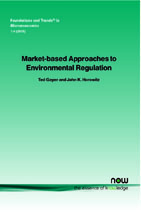Market-based Approaches to Environmental Regulation
By Ted Gayer, Georgetown University, USA, gayert@georgetown.edu | John K. Horowitz, Department of Agricultural and Resource Economics, 2104 Symons Hall, University of Maryland, USA, jhorowitz@arec.umd.edu
Abstract
Economists argue that policymakers should take advantage of market principles in designing environmental regulations. Such market-based approaches – environmental taxes and cap-and-trade – use economic incentives to achieve environmental goals at lower costs. Market-based approaches have now become common due to near-unanimous advocacy by economists and early positive policy experiences. Despite this acceptance, policymakers have often merged market-based incentives onto existing non-market approaches resulting in a set of mixed policies whose economic properties are often difficult to unravel. Thus, even the most prominent market-based regulations contain many non-market elements. The authors review the economics literature on the rationale for and optimal design of environmental taxes and cap-and-trade systems. They then discuss the structure and economics of the major U.S. market-based policies.
Market-based Approaches to Environmental Regulation
Market-based Approaches to Environmental Regulation reviews the economics literature of market-based environmental regulations and design issues for environmental taxes and cap-and-trade systems. It begins by reviewing the economics literature on the theory of market-based environmental regulations. It then goes on to cover design issues for environmental taxes and cap-and-trade systems. Market-based Approaches to Environmental Regulation also discusses the U.S. experience with a number of regulatory approaches that are commonly characterized as market-based and describes the mix of market and non-market instruments that characterize these policies. Market-based Approaches to Environmental Regulation will be of interest to all researchers and practitioners in the field of environmental regulation.
